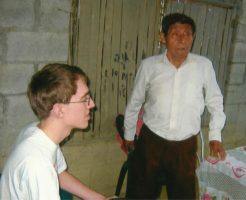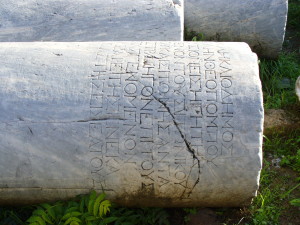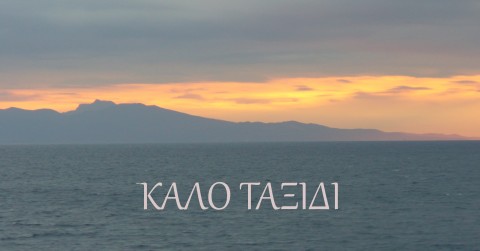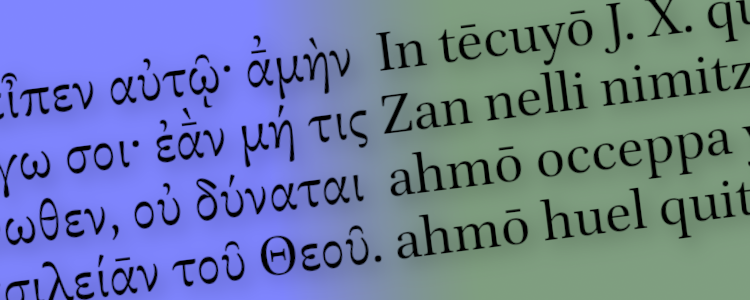There was a time, not so long ago, when I fancied myself somewhat of an expert in the ancient Greek language. I learned the Greek alphabet shortly after learning the Roman one, and throughout childhood I studied the language slowly but surely. Upon arriving at university, the Greek professors graciously allowed me to test out of the first year of Greek, which is how I ended up taking Greek 3 during my first semester, and went on to take every Greek class that was available. So imagine my surprise, when, after all those years of acquainting myself with the language, for the first time I recently came across the fact that ancient Greek has phonemic vowel length. I had a foggy notion of Eta and Omega being “long” vowels and Epsilon and Omicron being “short” vowels, but I had chalked it up to being a weak attempt at explaining how they should be pronounced, something akin to how in my native English they say that the A in “apple” is short, whereas the “A” in “acorn” is long. Phonologically speaking, the difference between these two is a difference in quality, not quantity—in fact, the A in “acorn” is a diphthong; not even a simple vowel!
Read MoreCategory: Greek
Want to learn a language? Join a community.
 Some people have wishlists of things they hope to get for Christmas, or places they would like to go to on vacation. As a language nut, I understandably have a long list of languages that I would like to learn. There are so many interesting languages in the world, and so little time to learn them!
Some people have wishlists of things they hope to get for Christmas, or places they would like to go to on vacation. As a language nut, I understandably have a long list of languages that I would like to learn. There are so many interesting languages in the world, and so little time to learn them!
Looking at the languages I have tackled, however, the thing I’ve realized is that I only become proficient in a language when I have a community of people to speak it with. Take Spanish, for instance—for the past 9 years, I have spoken Spanish on a weekly basis with Spanish-speaking Christians, and thus I have gotten pretty good at speaking it. However, I still cannot speak Greek, even though I have been studying it even longer than Spanish. And why is that? Perhaps it’s because I don’t know anyone who speaks Greek, and it is a language I only use for reading and writing.
Recently I watched some interview videos on Chickasaw.tv about Joshua Hinson, the current director of the Chickasaw Language Department. He grew up in west Texas, and dabbled in some of the Chickasaw language early on, but he didn’t become proficient in the language until he reconnected with the Chickasaw community in Oklahoma and began actively seeking out native speakers to talk with. Read More
My Language Friends: Greek

Although I was passively exposed to Spanish growing up in Texas, the first language I started learning was Greek—koine Greek to be precise. My father had “taken” it in college, and while he didn’t retain much of it even over summer break, he wanted to spark my interest in it at an early age. He taught me the alphabet and a few key words, and he even made a little quiz for me, to test my rudimentary Greek knowledge.
I was proud of my accomplishments, and soon began studying Greek as part of my schoolwork, going through the series of workbooks called Hey Andrew! Teach Me Some Greek! (That’s the beauty of homeschooling—your study options are limitless!) The Hey Andrew! books were good, but went along at a dreadfully slow pace. I felt like it would be forever before I got to learn about adjectives! But by the time I went through the whole series, I had a good knowledge of Greek grammar. I think they may have even added another level since I finished.
At university, I wanted to minor in Greek New Testament, but I was afraid that the first basic classes would just be a boring review of things I already knew. So I had a talk with the Bible faculty, and arranged to take a special test to see if I was ready for second-year Greek classes. I brushed up on my Greek skills, and easily passed the test. So it was that I was taking Greek 3 as a freshman! From there I took all the Greek classes that my university offered, and quite enjoyed it. Read More
Greek in a Week
 I love Greek. It has an awesome alphabet, cool cases, and a long legacy, and despite rumours to the contrary, it’s a living and growing language up to this day. It’s not quite my favourite language, but it’s right on up there, and over these next several days I’m finally getting around to improving my abilities in this noble and ancient tongue.
I love Greek. It has an awesome alphabet, cool cases, and a long legacy, and despite rumours to the contrary, it’s a living and growing language up to this day. It’s not quite my favourite language, but it’s right on up there, and over these next several days I’m finally getting around to improving my abilities in this noble and ancient tongue.
Of late my language learning has been kind of sporadic. Officially I am working on Nahuatl, in preparation for an upcoming trip to Mexico, and since a Korean sister in Christ has offered to help me with Korean once a week, I’ve been doing that. However, in general I haven’t been very focused or diligent in either Nahuatl or Korean lately for various reasons.
However, this time next week is the annual Atlanta Greek Festival, and since I enjoyed it last year, I would very much like to go again–and that means speaking Greek!
I have an interesting relationship with Greek. We got acquainted when I was quite young–in fact it was one of the first languages I ever studied, and I took special pride in being the only 10-year old I knew of who could parse Greek verbs. Nowadays I read from the Greek New Testament every day, and write in my study journal in Greek. I’m also currently reading the medieval epic Digenes Akritas, which is its own unique flavour of Greek. But the sad part is that I really cannot speak Greek, despite all this knowledge of the language!
Last year at the Greek Festival, I made a special effort to ask around and see if I could find somebody who spoke Greek. But when I found those people, I felt woefully inadequate as my brain protested “You want me to speak what? After filling me up with Nahuatl?”
But not this time! As a long-time lover and learner of Greek, I am going to try hard during these next seven days to review my basic knowledge of Modern Greek, form sentences aloud, and practice phrases that would be useful when meeting someone for the first time. It will be challenging, but I think with some effort I will feel much more prepared to go to the Greek Festival and enjoy it much more than last year!
Γνῶσις τῆς γλώσσης ἢ θάνατος!
Bon Voyage

I always enjoy gaining insights into other cultures, especially through their own languages. I came across one recently that really made me think, and you may find it interesting, too.
On Facebook I “like” a Greek musician, Areti Ketime. And being one of her likers, her posts show up on my newsfeed. I enjoy reading them to practice my Greek, even though they usually consist of announcements for concerts that I can’t go to. But this time it was different: she posted something that alluded to the recent passing of an (apparently) famous Greek musician. What caught my eye, though, was not the post, but the comments that followed it. People said the things people usually say when someone like that dies—expressing how much they loved his music, etc. But almost every commenter also included the phrase “Καλό ταξίδι!”, or some form of it, addressed to this deceased musician. That’s the Greek way of saying “Have a good trip!”, or “Bon voyage !” if you please, and in this context it intrigued me.
Greece is known as one of the most religious countries in Europe, and while I don’t know what the Greek Orthodox beliefs on the afterlife are, it was apparent that these well-wishers had full confidence that this man was on his way to a new destination. I like this point of view, and perhaps we should remember more often that those who have passed on are not dead forever, but only gone to another place; and if they were faithful in this life, we may see them again if we follow the same path.
